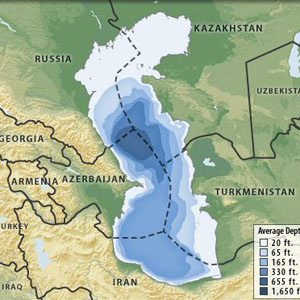More to Share than Dispute
Bahram Amir Ahmadian says that the potentials lying in Caspian are a fertile ground for augmented cooperation between littoral states

On Tuesday, Iranian Foreign Minister Manouchehr Mottaki stated that the work to draft Caspian Sea’s legal regime has been 70% complete. Mottaki also added that there is no need for US intervention in the disagreement between Azerbaijan and Turkmenistan.
Bahram Amir Ahmadian, university professor and Caspian affairs analyst has commented on Caspian Sea legal regime and disagreements between littoral states:
The report provided by the Iranian delegation shows that the Caspian legal regime is developing in the right path and negotiations have been constructive. The fact that negotiations are still going on is heartwarming per se.
Developing the legal regime is not an overnight task. The collaboration between expert workgroups and officials at different levels indicates progress. However, the finalization of the regime may take years to be accomplished. It is a matter of quality, not quantity and no time limit can be determined for it.
These days, we have heard about US offer to mediate between Azerbaijan and Turkmenistan on the Sardar/Kapaz oil field in the Caspian. It seems that further bilateral talks will resolve the issue and there is no need for the intervention of a third party. However, the two countries’ disagreement over the issue will not be simply resolved. Since the legal regime has not been finalized, disputes over sovereignty and the median line will continue for a likely long time. The two countries may want to freeze the issue so that it would not impede the more important problem of developing a legal regime for the Caspian Sea. Iran has the same problem over Alborz field with other littoral states, but it has decided to leave the moot point until the regime is finalized.
Meanwhile, Iran can follow its negotiations with Azerbaijan and Turkmenistan over demarcation of the Caspian sub-basin. This is a matter separate from the disagreement between its northwestern and northeastern neighbors. Russians have followed the same procedure and held quadrilateral talks with other littoral states (excluding Iran). Such talks could not influence the legal regime.
There is more to share than dispute in the Caspian Sea. Various potentials lie in the Caspian which can provide a basis for cooperation between the littoral states. The economic interests of oil and gas fields, marine transportation, tourism, environment conservation, Nowruz and other cultural events etc. are all fertile grounds for reinforcing bilateral and multilateral ties.
However, the most urgent task seems to be found a Caspian littoral states cooperation organization which could function as an arm for collaborative activities. Caspian Sea neighboring states should expand economic ties. Such cooperation facilitates political and cultural exchanges.
Bahram Amir Ahmadian, university professor and Caspian affairs analyst has commented on Caspian Sea legal regime and disagreements between littoral states:
The report provided by the Iranian delegation shows that the Caspian legal regime is developing in the right path and negotiations have been constructive. The fact that negotiations are still going on is heartwarming per se.
Developing the legal regime is not an overnight task. The collaboration between expert workgroups and officials at different levels indicates progress. However, the finalization of the regime may take years to be accomplished. It is a matter of quality, not quantity and no time limit can be determined for it.
These days, we have heard about US offer to mediate between Azerbaijan and Turkmenistan on the Sardar/Kapaz oil field in the Caspian. It seems that further bilateral talks will resolve the issue and there is no need for the intervention of a third party. However, the two countries’ disagreement over the issue will not be simply resolved. Since the legal regime has not been finalized, disputes over sovereignty and the median line will continue for a likely long time. The two countries may want to freeze the issue so that it would not impede the more important problem of developing a legal regime for the Caspian Sea. Iran has the same problem over Alborz field with other littoral states, but it has decided to leave the moot point until the regime is finalized.
Meanwhile, Iran can follow its negotiations with Azerbaijan and Turkmenistan over demarcation of the Caspian sub-basin. This is a matter separate from the disagreement between its northwestern and northeastern neighbors. Russians have followed the same procedure and held quadrilateral talks with other littoral states (excluding Iran). Such talks could not influence the legal regime.
There is more to share than dispute in the Caspian Sea. Various potentials lie in the Caspian which can provide a basis for cooperation between the littoral states. The economic interests of oil and gas fields, marine transportation, tourism, environment conservation, Nowruz and other cultural events etc. are all fertile grounds for reinforcing bilateral and multilateral ties.
However, the most urgent task seems to be found a Caspian littoral states cooperation organization which could function as an arm for collaborative activities. Caspian Sea neighboring states should expand economic ties. Such cooperation facilitates political and cultural exchanges.

